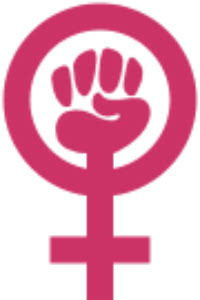O Feminism (from latin female, means “woman”) is a concept that emerged in the 19th century, which developed as a philosophical, social and political movement.
Its main characteristic is the struggle for gender equality (men and women), and consequently for the participation of women in society.

Symbol of Feminism
It is worth remembering that our culture is largely based on a patriarchal society, based on male domination.
The man, in addition to being the most important member of the family, has been the main focus for a long time. He is the one who has privileges in relation to women, mistakenly called the “weaker sex”.
This ideological movement, led by women and defending equal rights, has expanded around the world. Currently, feminist groups have grown considerably.
History of Feminism
The story of female “empowerment” is not as old as it should be. In general, until the nineteenth century, women were seen as inferior to men, who did not have the same privileges as men, for example, reading, writing, studying, fighting, in short, choosing.
Therefore, the female figure was built in a patriarchal society, where the attributions of women were restricted to household chores and the education of children.
From an early age, girls were educated to help their mothers with housework, get married and have children. In this context, they could not work outside the home, while they did not have access to matters related to politics or economics.
In the French Revolution (1789) the “Declaration of Human and Citizen's Rights”, written in the year of the Revolution, was fought by the “Declaration of the Rights of Women and Citizens”, written by the French feminist Olympe de Gouges (1748-1793) in 1791.
In the document, she criticized the Declaration of the Revolution, as it was only applied to men. Furthermore, it warned of male authority and the importance of women and equal rights.
For this reason, the revolutionary was executed in Paris, on November 3, 1793. However, her death, considered a landmark of feminism in the world, gave rise to several later feminist movements.
However, it was after the Industrial Revolution in the 19th century that this panorama changed substantially. Women are already starting to work in factories, being part of the country's economic strength.
Thus, little by little, feminist movements around the world were taking shape and increasingly fighting and conquering various rights claimed by women (right to education, vote, contract, property, divorce, equal pay, abortion, etc.).
In Western cultures, the feminist movement gained greater visibility from the 20th century onwards.
In more distant times it would be unthinkable to have a woman president running the country, or even, female figures acting and enshrining themselves in various fields: cultures, arts, economics, politics, etc.
Nowadays, most women prefer not to start a family, that is, not to have husbands or children, a fact considered absurd before the 19th century.
Without a doubt, the existentialist French philosopher Simone de Beauvoir (1908-1986) was one of the greatest theorists and representatives of world feminism.
On the subject, her reference work is the essay entitled "the second sex”(1949), where she analyzes the role of women in society. According to her, “Nobody is born a woman: they become a woman”.
Chauvinism
O Chauvinism is a term determined by the set of sexist practices, which defend the superiority of the male gender to the detriment of the female.
Associated with the ideology of the patriarchal system, macho practices or behaviors can be detected through phrases such as "Woman's place is in the kitchen”, “this is a man thing”. These sentences emphasize the inferiority of the female gender.
Importantly, machismo is not the opposite of feminism and is not only related to male behavior. This is because many women are responsible for reproducing macho practices.
Know more about:
- Feminism in Brazil
- violence against women
- Maria da Penha Law
- Misogyny: definition, origin and relationships between machismo and sexism
- Margaret Thatcher
- Amnesty Law
- Extraordinary Women Who Made History
- Women who made the history of Brazil
- Inspiring black women
Sociology in Enem: what to study


